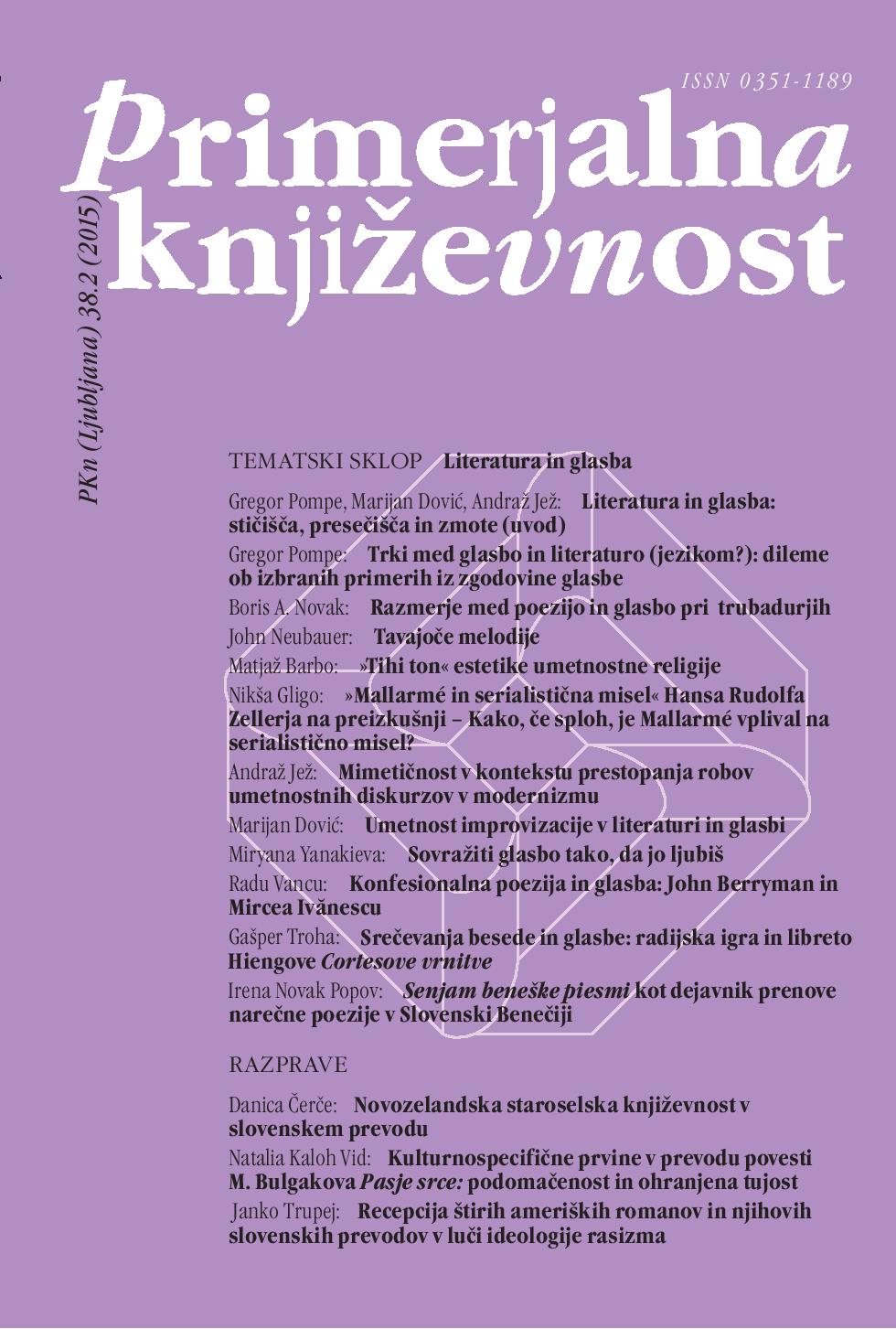The Art of Improvisation in Literature and Music
Keywords:
literature and music, improvisation, jazz, folk songs, Basque literature, bertsolaritzaAbstract
The article deals with the art of improvisation as “extemporization”, i.e., spontaneous production of a (spoken, musical, etc.) text(ure) without a detailed previous preparation, which takes place in real time, during the performance. As a primal principle of intuitive responding to stimuli from the environment or from performer’s interior, improvisation is an indispensable part of everyday life. As history of arts clearly demonstrates, improvisation has always been an important principle of artistic creation as well – particularly in the “temporal” and performing arts. However, it was gradually ousted from most artistic discourses (e.g., from written literature and composed music) and only survived at their edges. This article does not deal so much with the spontaneous improvisation (e.g., two-year old child banging on the piano) but focuses on structured improvisation, where the essential concept of spontaneity is creatively confronted with tradition (the referential corpus, improvisational principles and patterns) and improvising community (competition). More specifically, it discusses two cases of improvised traditions in literature and music that are still vital (in both of them, the original connection of literature and music remains visible to some extent): the sung improvised poetry of Basque bertsolari which is based upon ancient, yet vibrant tradition of oral literature, and modern jazz improvisation as it has evolved from the mid-twentieth century on. Both cases demonstrate that the most complex forms of improvisation are not primarily a matter of elusive (mystical) inspiration, but should instead be understood as art in terms of Aristotelian skill (technē). As the contemporary cognitive theories confirm, improvisation in the arts provides freshness and breaks the ossified patterns, so its rehabilitation process – already perceivable in music and theater but only partly in literature – needs to be further promoted.References
Amalietti, Peter. Temelji jazzovske improvizacije. Ljubljana: Amalietti, 1997.
Baker, David. Jazz Improvisation. A Comprehensive Method of Study for All Players. Chicago: Maher, 1969.
Bergonzi, Jerry. Developing a Jazz Language. Inside Improvisation Series 6. Rottenburg: Advance Music, 2003.
Berkowitz, Aaron L. The Improvising Mind: Cognition and Creativity in the Musical Moment. New York: Oxford University Press, 2010.
Burrows, Jared B. »Musical Archetypes and Collective Consciousness: Cognitive Distribution and Free Improvisation.« Critical Studies in Improvisation / Études critiques en improvisation 1.1 (2004). www.criticalimprov.com. Dostop september 2014.
Collins, Derek. »Homer and Rhapsodic Competition in Performance.« Oral Tradition 16.1 (2001): 129–167.
Dean, Roger T. in Freya Bailes. »Cognitive Processes in Musical Improvisation: Some Prospects and Implications.« Improvisation, Community, and Social Practice (2010). www.improvcommunity.ca/. Dostop september 2014.
Egaña, Andoni. »The Process of Creating Improvised Bertsos.« Oral Tradition 22.2 (2007): 117–142.
Eizagirre, Estitxu. »Interview with Maialen Lujanbio Zugasti.« Oral Tradition 22.2 (2007): 187–197.
Esterhammer, Angela. Romanticism and Improvisation, 1750–1850. Cambridge: Cambridge University Press, 2008.
Foley, John M. »Basque Oral Poetry Championship.« Oral Tradition 22.2 (2007): 3–11.
Foster, H. Wakefield. »Jazz Musicians and South Slavic Oral Epic Bards.« Oral Tradition 19.2 (2004): 155–176.
Garzia, Joxerra. »History of Improvised Bertsolaritza: A Proposal.« Oral Tradition 22.2 (2007): 77–115.
Gillespie, Luke O. »Literacy, Orality, and the Parry-Lord ‘Formula’: Improvisation and the Afro-American Jazz Tradition.« International Review of Aesthetics and Sociology of Music 22.2 (1991): 147–164.
Golež Kaučič, Marjetka. Ljudsko in umetno – dva obraza ustvarjalnosti. Ljubljana: ZRC SAZU, 2003.
Harris, William. »Improvisation: The New Spirit in the Arts.« Humanities and the Liberal Arts. http://community.middlebury.edu/~harris/improvisation.html. Dostop september 2014.
Harvilahti, Lauri. »The Production of Finnish Epic Poetry – Fixed Wholes or Creative Compositions?« Oral Tradition 7.1 (1992): 87–101.
Haydar, Adnan. »The Development of Lebanese Zajal: Genre, Meter, and Verbal Duel.« Oral Tradition 4.1–2 (1989): 189–212.
Henke, Robert. »Orality and Literacy in the Commedia dell’Arte and the Shakespearean Clown.« Oral Tradition 11.2 (1996): 222–248.
Keller, Gary. The Jazz Chord and Scale Handbook: A Comprehensive Organizational Guide to Scales and Chords Found in Jazz and Contemporary Music. Rottenburg: Advance Music, 1998.
Liebman, David. A Chromatic Approach to Jazz Harmony and Melody. Rottenburg: Advance Music, 1991.
Lord, Albert B. The Singer of Tales. Cambridge: Harvard University Press, 1960.
Mantie, Roger. »Schooling the Future: Perceptions of Selected Experts on Jazz Education.« Critical Studies in Improvisation / Études critiques en improvisation 3.2 (2008). www.criticalimprov.com. Dostop september 2014.
Martin, Henry. Charlie Parker and Thematic Improvisation. Lanham: Scarecrow Press, 1996.
McGee, Timothy J., ur. Improvisation in the Arts of the Middle Ages and Renaissance. Kalamazoo: Western Michigan University, 2003.
Middleton, Andy. Melodic Improvising. Rottenburg: Advance Music, 1998.
Mouillot, François. »Resisting Poems: Expressions of Dissent and Hegemony in Modern Basque Bertsolaritza.« Critical Studies in Improvisation / Études critiques en improvisation 5.1. (2009). www.criticalimprov.com. Dostop september 2014.
Nettl, Bruno et al. »Improvisation.« Grove Music Online, Oxford Music Online. www.oxfordmusiconline.com. Dostop september 2014.
O’Gallagher, John. Twelwe-Tone Improvisation. A Method for Using Tone Rows in Jazz. Mainz: Advance Music, 1998.
Parry, Milman. »Studies in the Epic Technique of Oral Verse-Making. I. Homer and Homeric Style.« Harvard Studies in Classical Philology 41.80 (1930): 73–147.
Parker, Charlie. Charlie Parker Omnibook, trans. Jamey Aebersold in Ken Sloane. Hollywood: Atlantic Records, 1978.
Pressing, Jeff. »Improvisation: Methods and Models. Generative Processes in Music.« J. Sloboda, ur. The Psychology of Performance, Improvisation and Composition. Oxford: Clarendon Press, 1988. 298–345. http://musicweb.ucsd.edu/~sdubnov/Mu206/improv-methods.pdf. Dostop oktober 2014.
Sbait, Dirghām H. »Palestinian Improvised-Sung Poetry: The Genres of Hidā and Qarrādī – Performance and Transmission.« Oral Tradition 4.1–2 (1989): 213–235.
Werner, Kenny. Free Play (13 Musical Landscapes). Jamey Aebersold Play-A-Long 104. New Albany: Jamey Aebersold Jazz, 2002.


